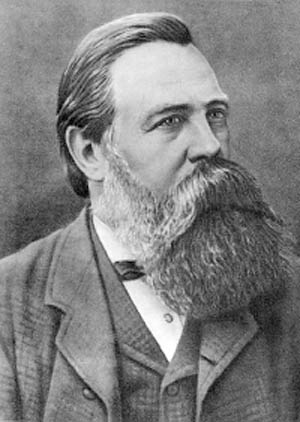“El estado moderno no es sino un comité que administra los problemas comunes de la clase burguesa.”
Fuente: Manifiesto Comunista, junto a Karl Marx.
Friedrich Engels, llamado a veces en español Federico Engels , fue un filósofo y revolucionario alemán.
Amigo y colaborador de Karl Marx, fue coautor con él de obras fundamentales para el nacimiento de los movimientos socialista, comunista y sindical, y dirigente político de la Primera Internacional y de la Segunda Internacional.

“El estado moderno no es sino un comité que administra los problemas comunes de la clase burguesa.”
Fuente: Manifiesto Comunista, junto a Karl Marx.
Fuente: Para leer "El Capital", ISBN 8425304989, p. 11.
Fuente: Dialéctica de la naturaleza.
Fuente: Junto a Karl Marx, Manifiesto Comunista, 1848.
Letter to Conrad Schmidt http://www.marxists.org/archive/marx/works/1890/letters/90_08_05.htm (August 5, 1890)
The Communist Manifesto, footnote (1888 edition)
Anti-Dühring http://www.marxists.org/archive/marx/works/subject/quotes/index.htm (1878)
Diese aus dem gegenseitigen Neid und der Habgier der Kaufleute entstandene Nationalökonomie oder Bereicherungswissenschaft trägt das Gepräge der ekelhaftesten Selbstsucht auf der Stirne.
Outlines of a Critique of Political Economy (1844)
The Origin of the Family, Private Property and the State (1804) as translated by Ernest Untermann (1902); Full English text of The Origin of the Family, Private Property and the State http://www.marxists.org/archive/marx/works/1884/origin-family/index.htm - Full original-language German text of The Origin of the Family, Private Property and the State http://www.mlwerke.de/me/me21/me21_025.htm
(1847)
Die Nationalökonomie entstand als eine natürliche Folge der Ausdehnung des Handels, und mit ihr trat an die Stelle des einfachen, unwissenschaftlichen Schachers ein ausgebildetes System des erlaubten Betrugs, eine komplette Bereicherungswissenschaft.
Outlines of a Critique of Political Economy (1844)
Fuente: (1845), p. 275
Ihr habt ... die Kriege vermindert, um im Frieden desto mehr zu verdienen, um die Feindschaft der einzelnen, den ehrlosen Krieg der Konkurrenz, auf die höchste Spitze zu treiben!
Wo habt ihr etwas aus reiner Humanität, aus dem Bewußtsein der Nichtigkeit des Gegensatzes zwischen dem allgemeinen und individuellen Interesse getan? Wo seid ihr sittlich gewesen, ohne interessiert zu sein, ohne unsittliche, egoistische Motive im Hintergrund zu hegen?
Outlines of a Critique of Political Economy (1844)
(1847)
Introduction to 1891 edition of Karl Marx's, The Civil War in France
(1847)
(1847)
Fuente: The Condition of the Working Class in England in 1844 (1845), p. 27
Die Nachfrage des Ökonomen ist nicht die wirkliche Nachfrage, seine Konsumtion ist eine künstliche. Dem Ökonomen ist nur der ein wirklich Fragender, ein wirklicher Konsument, der für das, was er empfängt, ein Äquivalent zu bieten hat.
Outlines of a Critique of Political Economy (1844)
Anti-Dühring http://www.marxists.org/archive/marx/works/subject/quotes/index.htm (1878)
Letter to Philipp Van Patten http://www.marxists.org/archive/marx/works/1883/letters/83_04_18.htm (18 April 1883)
Introduction (1895) https://www.marxists.org/archive/marx/works/1850/class-struggles-france/intro.htm to Marx's The Class Struggles in France (1848-50)
Letter https://marxists.catbull.com/archive/marx/works/1851/letters/51_05_23.htm to Karl Marx (23 May 1851)